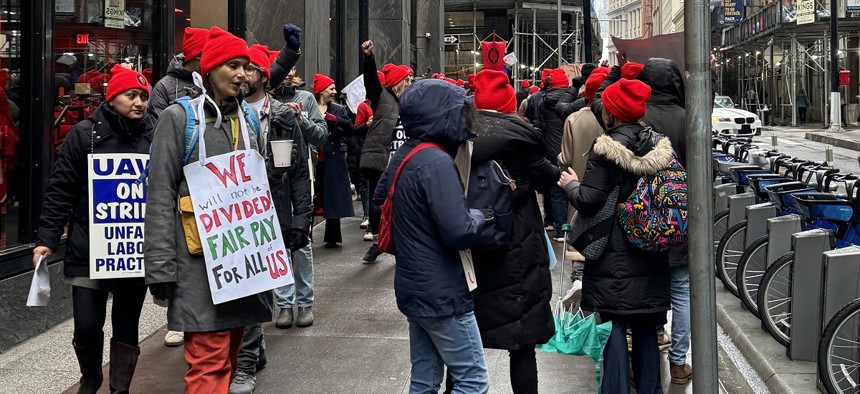Nonprofits
Mobilization for Justice employees stage one-day strike
The workers joined by New York Assembly Member Zohran Mamdani on the picket line demanded higher wages following high inflation and post-pandemic work.

Unionized employees at Mobilization for Justice walk the picket line on a one-day strike on Friday. Phenix Kim
Unionized employees at Mobilization for Justice held a one-day strike to protest the nonprofit law firm’s management for alleged unfair labor practices, using the demonstration to state their commitment to fair contracts for attorneys, legal workers and non-legal support staff. More than 80 employees, members of the Legal Services Staff Association (LSSA) 2320, protested in front of the nonprofit’s Manhattan headquarters.
Founded in 1962, as the “ legal arm of Mobilization for Youth ''— a large community-based anti-poverty program based on the Lower East Side of Manhattan, Mobilization for Justice provides free civil legal services to low-income New Yorkers. Its mission is to facilitate equal access to justice through community-based legal representation. The organization serves nearly 15,000 clients across all five boroughs in New York City, prioritizing the needs of disenfranchised individuals and clients who struggle with disabilities and its effects of social injustice and systemic racism.
The union has argued that management repeatedly failed to meet fair bargaining obligations, disregarding the needs of legal workers, most of whom struggle with the effects of high inflation, pay disparities and burn-out following the COVID-19 pandemic.
“They continue to refuse to engage with us on meaningful salary increases to make up for the fact that we lost more than 10% of all our wages to inflation, and the percent increases offered are paltry – which will likely lead to a further loss of wages, and further attrition. We're trying to push management to fix those broken scales, and give folks real living wages which they need to continue to do high quality work,” said union bargaining committee member Brenden Ross.
New York Assembly Member Zohran Mamdani joined the picket line with the striking employees, urging elected officials to stand with underpaid workers across the city.
“We signed up for the fight for the working class. And it's the rational and logical decision when you're asking for increases that are in line with the work that you do. It’s critical that they understand that when you’re underpaid, you're ensuring that your clients are receiving worse care. Because in this kind of work, they always try to pit staff against clients, when in fact there is no way for you to keep coming to work, if you will not be valued for the work that you do,” Mamdani said.
Union members charged that Mobilization for Justice has a track record for unjust pay that perpetuates racial income and wealth gaps, and promotes systemic racism, which clashes with the organization’s commitment to racial equity and advocacy.
“Disproportionately, these divisions cut across all other sorts of lines of oppression in our society,” Ross said. “Our support staff, our paralegals are more likely than other workers to be BIPOC and women. Black and brown folks are more likely to be support staff and paralegals are likely to be people of color. And so every single one of our demands that management refuses to meet us, disproportionately impacts people of color.”
The union also noted that management remains resistant to flexible work schedules – a feature adopted by most, if not all organizations during the pandemic. “A lot of it is resistance to the fact that we live in a different world than we did, pre-pandemic,” Ross said. “We've adapted in a way where much of our work can be done remotely. And they particularly refuse to engage with the idea that our non-attorneys are also able to do work remotely.”
The union has set a deadline for an offer from management of Feb. 9, when members expect to vote on the deal or return to the picket line.
“As a widowed single mother, work-from-home flexibility is critical in allowing me to be present for both my clients and my children in the way they deserve,” said Ana Lise Feliciano Hansen, a Senior Staff Attorney in MFJ’s Children’s Rights Project. “We need a fair contract that reflects the realities of life in 2024 and that does not make us choose unnecessarily between our families and our jobs.”
